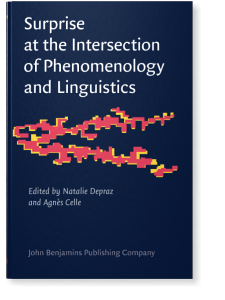Surprise at the Intersection of Phenomenology and Linguistics
Editors
Surprise is treated as an affect in Aristotelian philosophy as well as in Cartesian philosophy. In experimental psychology, surprise is considered to be an emotion. In phenomenology, it is only addressed indirectly (Husserl, Heidegger, Levinas), with the important exception of Ricœur and Maldiney; it is reduced to a break in cognition by cognitivists (Dennett). Only recently was it broached in linguistics, with a focus on lexico-syntactic categories. As for the expression of surprise, it has been studied in connection with evidentiality in languages that encode surprise morphosyntactically. However, how surprise is encoded in languages that lack an evidential morphosyntactic system has been largely unexplored.
This book provides new insights into the dynamics of surprise based on a heuristic hypothesis tested against the investigation of time, language and emotion. It is intended to arouse the interest of a multidisciplinary audience keen on crossing the disciplinary borders of phenomenology, cognitive sciences, and pragmatics.
The theoretical approaches adopted in this collection of articles rely on experiments and corpus data. They advance knowledge by building on robust empirical results coming from psychology, microphenomenology, linguistics and physiology.
This book provides new insights into the dynamics of surprise based on a heuristic hypothesis tested against the investigation of time, language and emotion. It is intended to arouse the interest of a multidisciplinary audience keen on crossing the disciplinary borders of phenomenology, cognitive sciences, and pragmatics.
The theoretical approaches adopted in this collection of articles rely on experiments and corpus data. They advance knowledge by building on robust empirical results coming from psychology, microphenomenology, linguistics and physiology.
[Consciousness & Emotion Book Series, 11] 2019. vi, 185 pp.
Publishing status: Available
© John Benjamins
Table of Contents
-
IntroductionNatalie Depraz and Agnès Celle | pp. 1–6
-
Part I. The temporality of surprise: A dynamic process opening up possibilities
-
Chapter 1. Neurophenomenology of surpriseMichel Bitbol | pp. 9–22
-
Chapter 2. Shock, twofold dynamics, cascade: Three signatures of surprise. The micro-time of the surprised bodyNatalie Depraz | pp. 23–42
-
Chapter 3. The representation of surprise in English and the retroactive construction of possible pathsGraham Ranger | pp. 43–56
-
Part II. Verbal interaction and action
-
Chapter 4. Encoding surprise in English novels: An enunciative approachCatherine Filippi-Deswelle | pp. 59–76
-
Chapter 5. How implicit is surprise? Confronting a phenomenological description with a radical pragmatist approachAudrey Gerlain | pp. 77–90
-
Chapter 6. Surprise in native, bilingual and non-native spontaneous and stimulated recall speechPascale Goutéraux | pp. 91–114
-
Part III. Emotional experience, expression and description
-
Chapter 7. Interrogatives in surprise contexts in EnglishAgnès Celle, Anne Jugnet, Laure Lansari and Tyler Peterson | pp. 117–138
-
Chapter 8. Looking at ‘unexpectedness’: A corpus-based cognitive analysis of surprise & wonderAnne Jugnet and Emilie Lhôte | pp. 139–170
-
Chapter 9. Is surprise necessarily disappointing?Claudia Serban | pp. 171–180
-
Index | pp. 181–185
Cited by (3)
Cited by three other publications
Türkyılmaz, Bahar
Ross, Wendy & Margaret Webb
This list is based on CrossRef data as of 29 july 2024. Please note that it may not be complete. Sources presented here have been supplied by the respective publishers. Any errors therein should be reported to them.
Subjects
Consciousness Research
Philosophy
Psychology
Main BIC Subject
CFG: Semantics, Pragmatics, Discourse Analysis
Main BISAC Subject
LAN009030: LANGUAGE ARTS & DISCIPLINES / Linguistics / Pragmatics
